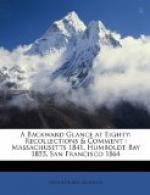FREDERICK LUCIAN HOSMER
I cannot forego the pleasure of referring with sincere affection to my brother octogenarian, Frederick L. Hosmer. He achieved the fullness of honor two months in advance of me, which is wholly fitting, since we are much farther separated in every other regard. He has been a leader for a great many years, and I am proud to be in sight of him.
His kindly friendship has long been one of the delights of my life, and I have long entertained the greatest respect and admiration for his ability and quality. As a writer of hymns he has won the first place in the world’s esteem, and probably his noble verse is (after the Psalms) the most universally used expression of the religious feeling of mankind. More worshipers unite in singing his hymns, Unitarian though he be, than those of any other man, living or dead. It is a great distinction, and in meriting it he holds enviable rank as one of the world’s greatest benefactors.
Yet he remains the most modest of men, with no apparent consciousness that he is great. His humility is an added charm and his geniality is beautiful.
He has made the most of a fancied resemblance to me, and in many delightful ways has indulged in pleasantries based on it. In my room hangs a framed photograph signed “Faithfully yours, Chas. A. Murdock.” It is far better-looking than I ever was—but that makes no difference.
We were once at a conference at Seattle. He said with all seriousness, “Murdock, I want you to understand that I intend to exercise great circumspection in my conduct, and I rely upon you to do the same.”
I greatly enjoyed Dr. Hosmer’s party, with its eighty candles, and I was made happy that he could be at mine and nibble my cake. Not all good and great men are so thoroughly lovable.




